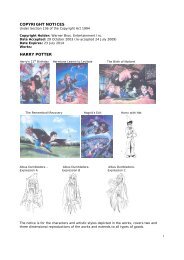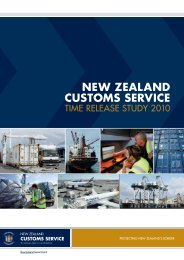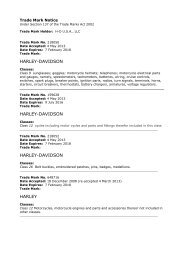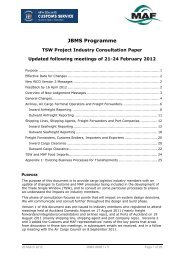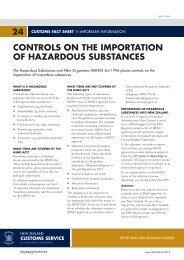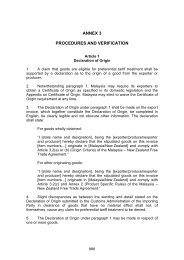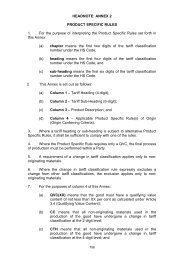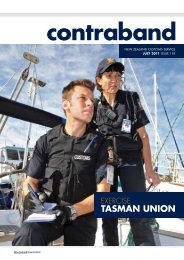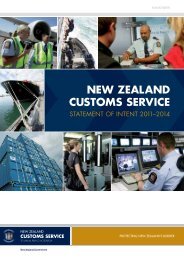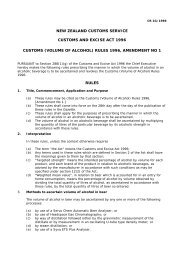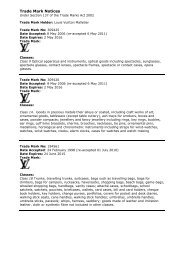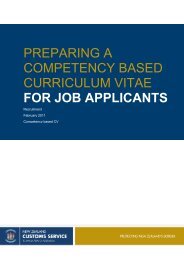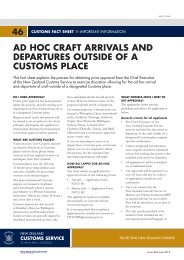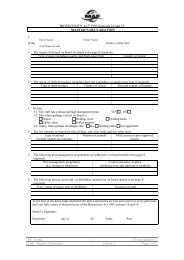NEW ZEALAND CUSTOMS SERVICE Code of ConduCt
NEW ZEALAND CUSTOMS SERVICE Code of ConduCt
NEW ZEALAND CUSTOMS SERVICE Code of ConduCt
You also want an ePaper? Increase the reach of your titles
YUMPU automatically turns print PDFs into web optimized ePapers that Google loves.
<strong>NEW</strong> <strong>ZEALAND</strong> <strong>CUSTOMS</strong> <strong>SERVICE</strong><strong>Code</strong> <strong>of</strong> Conduct
ContentsComptroller’s Introduction 4<strong>Code</strong> <strong>of</strong> Conduct Overview 4The standards 5Responsibilities 5Behaviour inconsistent with this <strong>Code</strong> <strong>of</strong> Conduct 5Standard 1: Fair 6Standard 2: Impartial 7Standard 3: Responsible 8Standard 4: Trustworthy 10Other Information 13<strong>Code</strong> <strong>of</strong> Conduct Employee Acknowledgement 13
Comptroller’s IntroductionThe extent to which our stakeholders continue to trust and respect the New Zealand Customs Service lies in theintegrity <strong>of</strong> our actions and the way we use our skills, knowledge, experience, and powers as we carry out our borderprotection work. This <strong>Code</strong> <strong>of</strong> Conduct underpins our work and ensures that there is no doubt <strong>of</strong> the behaviours thatour stakeholders can expect from Customs employees.This <strong>Code</strong> <strong>of</strong> Conduct is aligned with the State Service Commissioner’s Standards <strong>of</strong> Integrity and Conduct anddetails the minimum standards <strong>of</strong> behaviour required <strong>of</strong> all Customs employees. Customs has a strong and proudrecord <strong>of</strong> service and integrity. Maintaining this relies on each employee actively demonstrating Customs’ values andthe standards detailed in this <strong>Code</strong> <strong>of</strong> Conduct.Martyn DunneComptroller <strong>of</strong> Customs<strong>Code</strong> <strong>of</strong> Conduct OverviewPurposeThis <strong>Code</strong> <strong>of</strong> Conduct details the minimum standards <strong>of</strong> behaviour required <strong>of</strong> all Customs employees.It provides a framework through which Customs employees will act with integrity and a spirit <strong>of</strong> service, a requirement<strong>of</strong> all public service employees.These standards <strong>of</strong> behaviour will be demonstrated by all Customs employees, and will guide us when makingdecisions and taking actions.CoverageThis <strong>Code</strong> <strong>of</strong> Conduct applies to all employees <strong>of</strong> the New Zealand Customs Service, within New Zealand and<strong>of</strong>fshore. It also applies to persons engaged by Customs in contractor and consultant arrangements, and forms part<strong>of</strong> the terms and conditions <strong>of</strong> employment and engagement with Customs. For the purposes <strong>of</strong> this <strong>Code</strong> <strong>of</strong> Conduct,all such persons shall be referred to as ‘Customs employees’.Legislative FrameworkAll Customs employees have a responsibility under the State Sector Act 1988 to “maintain proper standards <strong>of</strong>integrity, conduct and concern for the public interest” (section 56 (3)). This <strong>Code</strong> <strong>of</strong> Conduct is consistent with theStandards <strong>of</strong> Integrity and Conduct, a <strong>Code</strong> <strong>of</strong> Conduct issued by the State Services Commissioner under section 57<strong>of</strong> the State Sector Act 1988.4
The standardsThe behaviour required <strong>of</strong> Customs employees falls under four Standards, which support Customs’ mission, visionand values:1. Fair2. Impartial3. Responsible4. TrustworthyThe standards are aligned to Customs four core values: integrity, commitment, respect, and agility. Our values arecritical to our success, and this <strong>Code</strong> <strong>of</strong> Conduct sets the minimum standards for how we will demonstrate thosevalues in actionWithin this <strong>Code</strong> <strong>of</strong> Conduct, each standard is detailed in its own section. Within each section are statements detailingthe requirements <strong>of</strong> that standard, and within each statement are sub-statements describing the behaviours required<strong>of</strong> Customs employees.ResponsibilitiesAll Customs employees are responsible for:• behaving in a manner consistent with this <strong>Code</strong> <strong>of</strong> Conduct• encouraging others to behave in a manner consistent with this <strong>Code</strong> <strong>of</strong> Conduct• reporting any behaviour that is inconsistent with this <strong>Code</strong> <strong>of</strong> Conduct.Customs managers are also responsible for:• being a good employer and dealing with employees in good faith• modelling the standards <strong>of</strong> behaviour detailed in this <strong>Code</strong> <strong>of</strong> Conduct• applying this <strong>Code</strong> <strong>of</strong> Conduct in an objective manner and appropriately addressing any behaviour that appearsinconsistent with this <strong>Code</strong> <strong>of</strong> Conduct.Behaviour inconsistentwith this <strong>Code</strong> <strong>of</strong> ConductBehaviour inconsistent with this <strong>Code</strong> <strong>of</strong> Conduct is not acceptable.Such behaviour will be addressed in a timely manner and could result in disciplinary action under Customs’disciplinary policy and procedures.5
Standard 1: Fair1.1 We must treat everyone fairly andwith respectAs Customs employees, we:• observe the principles <strong>of</strong> natural justice, discloserelevant and necessary information about the waywe make decisions, and allow a fair opportunity forpeople who may be affected by these decisions tomake representations• avoid any actual or perceived unfairness thatcould arise from having any personal interestin decisions made, or from working on matterswhere we have a close relationship with thoseinvolved. We will not show any favouritism,bias or self-interest in our work• make decisions based on accurate information,taking into account only relevant considerations.All decisions will be balanced, objective, andreached on their merits• are fair to the community as a whole, and donot concede to unreasonable demands frompeople seeking our services• treat the public and colleagues with respect by:- not discriminating against anyone,(except as legally required to give effectto New Zealand Customs Service operationalfunctions) on the basis <strong>of</strong> their gender,sexual orientation, colour, race, ethnic ornational origin, age, religious or ethicalbeliefs, disability, marital status, or familyresponsibilities- protecting the privacy <strong>of</strong> people accessingCustoms’ services- not harassing, bullying, or otherwiseintimidating others- respecting the cultural background <strong>of</strong> others- having proper regard for the safety <strong>of</strong> others- avoiding behaviour that may endanger orcause distress to others- valuing equality and diversity byunderstanding differences- communicating in a pr<strong>of</strong>essional manner- individually and collectively ensure thatinformation and services are provided ina way that takes account <strong>of</strong> the particularinterests, sensitivities and the backgrounds<strong>of</strong> people seeking those services.1.2 We must be pr<strong>of</strong>essional and responsiveAs Customs employees, we:• have personal integrity and we are committedto Customs’ vision, mission and values• maintain constructive, pr<strong>of</strong>essional relationshipswith external partners. We are always aware<strong>of</strong> our pr<strong>of</strong>essional responsibilities to Customs,and <strong>of</strong> maintaining good relationships withthe Government• are aware <strong>of</strong> the potential for, and implications<strong>of</strong>, conflicts <strong>of</strong> interest, and therefore act fairly,impartially, and transparently• respond in accordance with the intendedpurpose <strong>of</strong> Government policy and act withfairness and reasonableness, reflectinga commitment to the spirit <strong>of</strong> service.1.3 We must work to make governmentservices accessible and effectiveAs Customs employees, we:• are effective, and contribute effectivelyto the achievement <strong>of</strong> objectives thatCustoms has agreed with the Government• operate in a way that is helpful to those usingour services, liaising with other parts <strong>of</strong> the Stateservice and minimising barriers to any individual,group or community being disadvantaged.1.4 We must strive to make a difference tothe well-being <strong>of</strong> New Zealand and allits peopleAs Customs employees, we:• individually and collectively endeavour t<strong>of</strong>ind more efficient, effective, economical andsustainable ways <strong>of</strong> making a pr<strong>of</strong>essionalcontribution to the work <strong>of</strong> Customs .6
Standard 2: Impartial2.1 We must maintain the political neutralityrequired to enable us to work withcurrent and future governmentsAs Customs employees, we:• remain politically neutral and do nothingthat might detract from Customs ability towork with its minister and current Government(and also future ministers), regardless <strong>of</strong>the political parties they may represent• acknowledge our duty to Parliament andin support <strong>of</strong> the Government, and manageapproaches from members <strong>of</strong> parliamentin a strictly impartial way. Where thereis doubtabout the nature <strong>of</strong> an approach,we refer the matter to the Comptroller• are aware that perceptions <strong>of</strong> personalactivities could undermine the confidencethe public have in Customs ability t<strong>of</strong>ulfill its <strong>of</strong>ficial responsibilities• are free to belong to any lawful organisation.The right to participate in social campaignsand the activities <strong>of</strong> political parties, unions,and pr<strong>of</strong>essional associations is not precluded,however political rights must not be confusedor interfere with employment responsibilities orthe expectations outlined in this <strong>Code</strong> <strong>of</strong> Conduct.2.2 We must carry out the functions<strong>of</strong> Customs, unaffected by ourpersonal beliefsAs Customs employees, we:• are not precluded from having personal beliefs,interests and commitments, however, our workfor Customs will not be compromised by anypersonal conviction or ethical viewpoint• work as directed and obey all lawful andreasonable instructions given by Customsand its managers, and will never disregardCustoms operating procedures or exercisedecision-making responsibilities in a waythat suits our personal views or beliefs.2.3 We must support Customs toprovide robust and unbiased adviceAs Customs employees, we:• apply high standards <strong>of</strong> pr<strong>of</strong>essionalismand impartiality to the advice we prepare,regardless <strong>of</strong> whether that advice is forministers or other decision-makers• provide honest, impartial, comprehensiveand objective advice, free <strong>of</strong> personal interestand/or political bias, reflecting an understanding<strong>of</strong> the policies and priorities <strong>of</strong> the Government• are aware <strong>of</strong>, and work in a manner supportive<strong>of</strong>, the responsibilities placed on Customs,and on our senior managers and adviserswho work closely with ministers.2.4 We must respect the authority<strong>of</strong> the government <strong>of</strong> the dayAs Customs employees, we:• undertake activities in a manner that reflectsthe knowledge that we can influence the trustand confidence the public have in the Government• keep confidential the advice we have givento ministers, and comment on behalf <strong>of</strong>Customs only in accordance with Customspolicies for the release <strong>of</strong> <strong>of</strong>ficial information• act pr<strong>of</strong>essionally when publicly involvedin commenting on matters relating to ourorganisation, and in a manner that reinforcesour spirit <strong>of</strong> service to the community• not comment publicly on or criticise matters<strong>of</strong> current or proposed government policy, anyprogramme Customs has in operation, or theactivities <strong>of</strong> any other government organisation.7
Standard 3: Responsible3.1 We must act lawfully and objectivelyAs Customs employees, we:• obey the law and do not engage incorrupt practices• act within our powers and within any delegatedauthority when making a decision, and notmake any admission or promise on behalf <strong>of</strong>Customs or Government without authority• act objectively and with a balanced approachto our legislative responsibilities• maintain accurate, complete, and accessiblerecords <strong>of</strong> the decisions and actions we take• recognise that a consequence <strong>of</strong> working in theState service is that sometimes we have higherintegrity obligations than other people do• be aware that public trust is influencedby public perception, and we will respondobjectively if we become aware <strong>of</strong> anyunlawful activities in our organisation• support Customs in taking decisive actionwhen we learn that behavioural or performancestandards are being breached. This includescooperating with any investigation intothe possible breach <strong>of</strong> such standards.3.2 We must use Customs’ resourcescarefully and only for intended purposesAs Customs employees, we:• use resources efficiently, effectively, andeconomically, and account correctly forall transactions involving public money• acknowledge that Customs resources arepublicly owned and funded. We follow carefulprocesses to ensure that financial, physical, andstaffing resources are committed responsibly,and do not incur liability on the part <strong>of</strong> Customswithout appropriate authorisation• show reasonable care for and use Customsproperty for authorised purposes only. Customstelephones, technology-based resources, andother <strong>of</strong>fice equipment are used for occasionaland moderate personal use that is lawful andreasonable, within policies and procedures,and are not used to operate a private business.3.3 We must treat information with careand use it only for proper purposesAs Customs employees, we:• have a duty to handle <strong>of</strong>ficial informationappropriately and ensure that personalprivacy rights are preserved• are familiar with legal obligations relatingto the protection and release <strong>of</strong> <strong>of</strong>ficial orpersonal information, and apply those provisionsat all times• use information accessed or acquired throughwork solely for work purposes, disclosing it toothers only with the authorisation to do so orif it is already available to the public through<strong>of</strong>ficial sources• are discreet and apply appropriate security levelswhen discussing or disclosing Customs information• provide true and accurate statements andinformation, and do not remove, alter, ordestroy <strong>of</strong>ficial records without proper authority• give the public access to their own personalinformation, and make any <strong>of</strong>ficial informationavailable on request unless there are specificlegal or security reasons for withholding it.Such requests will be managed in accordancewith legislation and Customs policiesand procedures.3.4 We must work to improve the performanceand efficiency <strong>of</strong> CustomsAs Customs employees, we:• are aware <strong>of</strong> the sustainability implications<strong>of</strong> our actions at work• seek to make personal improvements in efficiency,in order to contribute to improvements in theoverall efficiency <strong>of</strong> Customs through its systemsand processes.8
Standard 4: Trustworthy4.1 We must be honestAs Customs employees, we:• are truthful and open, and act with a focuson accuracy and authenticity• set out facts and relevant issues truthfullyso as not to encourage misunderstanding,and correct any errors as soon as possible• understand that this obligation is not onlywork-related, and that it arises at any timewhen the consequences <strong>of</strong> conduct thatmay be seen as dishonest and may have animpact on public trust or on the confidencethat ministers, Parliament, or others in theState services, can have in Customs.4.2 We must work to the best <strong>of</strong> our abilitiesAs Customs employees, we:• attend work on days <strong>of</strong> duty unless otherwiseauthorised, work diligently, and to the best <strong>of</strong>our abilities in order to demonstrate a spirit<strong>of</strong> service and promote trust• ensure personal relationships in the workplacedo not affect the performance <strong>of</strong> <strong>of</strong>ficial duties• refrain from conduct, such as the use <strong>of</strong>alcohol or non-prescribed drugs, whichmight affect work performance• keep accurate and readily accessiblerecords <strong>of</strong> our decisions and actions inorder to promote public understandingand to maintain community confidence• endeavour to improve the quality andquantity <strong>of</strong> our work and in doing so supportothers within and across organisations toshare knowledge and expertise. We usepersonal development opportunities toincrease our skills and the value we canadd to our organisation.4.3 We must ensure our actions are notaffected by our personal relationshipsAs Customs employees, we:• ensure that our actions do not improperly benefit,or give preferential treatment to, family, friends,groups in which we have a personal interest, orpeople we are connected with in any way• avoid circumstances where our personalrelationships cause an actual or perceivedconflict with the interests <strong>of</strong> Customs, and ifsuch circumstances arise, we will declarethem as soon as possible to enable management<strong>of</strong> any actual or perceived conflict <strong>of</strong> interest• are fair, unbiased, and transparent in our actionswhich are able to bear close public scrutiny• seek to avoid actual or perceived bias as itplaces the impartiality <strong>of</strong> Customs at risk• are open with Customs and disclose personalrelationships that might cause an actual orperceived conflict <strong>of</strong> interest. This is to ensurethat there is no conflict with our <strong>of</strong>ficial dutiesand no adverse effect on our employment,efficiency or performance. Such disclosure willenable an objective discussion about how possibleor perceived affects can be avoided or mitigated.4.4 We must never misuse our positionfor personal gainAs Customs employees, we:• have a range <strong>of</strong> roles, responsibilities, and powersunder various legislation, which will be applied onlyfor the intended purpose and in the intended way• remain impartial in our work and are notinfluenced in any decision-making processby personal interests or advantage to ourselves,or to any person or organisation with whichwe are connected10
4.5 We must decline gifts or benefitsthat place us under any obligationor perceived influenceAs Customs employees, we:• are aware <strong>of</strong> the public perception thatcan result from accepting favours, benefitsand/or gifts• are careful about accepting any form <strong>of</strong>gift, benefit or gratuity that is not providedby Customs, and only accept anything<strong>of</strong>fered to us in connection with our workif specifically permitted by Customs policy.• declare all gifts received, and acceptceremonial gifts <strong>of</strong>fered which thereafterbecome the property <strong>of</strong> Customs.4.6 We must avoid any work or non-workinterests or activities or that mayharm the reputation <strong>of</strong> Customs or<strong>of</strong> the State servicesAs Customs employees, we:• understand that what we do in our personallives is <strong>of</strong> no concern to Customs except whereit may interfere with work performance, orreflects, or has the potential to reflect badlyon the integrity or standing <strong>of</strong> Customs orthe State services• acknowledge that Customs has a legitimateinterest in the activities <strong>of</strong> its employees if thoseactivities are likely to affect relationships withthe Government, other members <strong>of</strong> parliament,or the public• will not at any time engage in associationsthat might raise reasonable doubts as to oursuitability for continued employment in Customs• will consider, when making judgements aboutnon-work activities:- the nature and circumstances <strong>of</strong> the activity- our position, duties, and responsibilities- the consequences <strong>of</strong> the activity on ourability to fulfil our duties and responsibilities- the effects <strong>of</strong> the activity or its consequenceson Customs relationships with ministersand the public- any potential implications <strong>of</strong> the behaviouron levels <strong>of</strong> public trust in the State services• are open with Customs and disclose anycommitments, commercial activities,investments or other personal intereststhat might cause an actual or perceivedconflict <strong>of</strong> interest. Customs employees:- will not undertake additional employmentor be in commercial business without theconsent <strong>of</strong> Customs. This is to ensure thatthere is no conflict with our <strong>of</strong>ficial dutiesand no adverse effect on our employment,efficiency, or performance, or the operations<strong>of</strong> Customs. Such disclosure will enablean objective discussion about how possibleor perceived affects can be avoidedor mitigated.• understand that involvement in some personalactivities, including unlawful behaviour, or otherincidents involving a breach <strong>of</strong> trust, may bringCustoms into disrepute11
Other InformationReporting <strong>of</strong> wrongdoingAs Customs employees, we have a responsibility to notify a manager or Human Resources Advisor where we areconcerned about our own or others’ ability to act consistently with this <strong>Code</strong> <strong>of</strong> Conduct, or, where we have concernsabout the behaviour or integrity demonstrated by colleagues, which could bring Customs or the State services intodisrepute.We also have a specific responsibility to notify senior management where we have evidence <strong>of</strong> serious wrongdoing.Customs protected disclosures policy and procedure can be applied in such circumstances.<strong>Code</strong> <strong>of</strong> Conduct Employee AcknowledgementI acknowledge that I have received a copy <strong>of</strong> the New Zealand Customs Service <strong>Code</strong> <strong>of</strong> Conduct.I have read the <strong>Code</strong> <strong>of</strong> Conduct, I understand it, and I agree to comply with the standards <strong>of</strong> integrityand conduct detailed herein.I understand that behaviour inconsistent with this <strong>Code</strong> <strong>of</strong> Conduct is not acceptable, and that any suchbehaviour will be addressed in a timely manner and could result in disciplinary action under Customsdisciplinary policy and procedures.Employee name:Employee signature:Witness name:Witness signature:Witness position title:Date:Please complete and return this acknowledgement form to your manager.13



